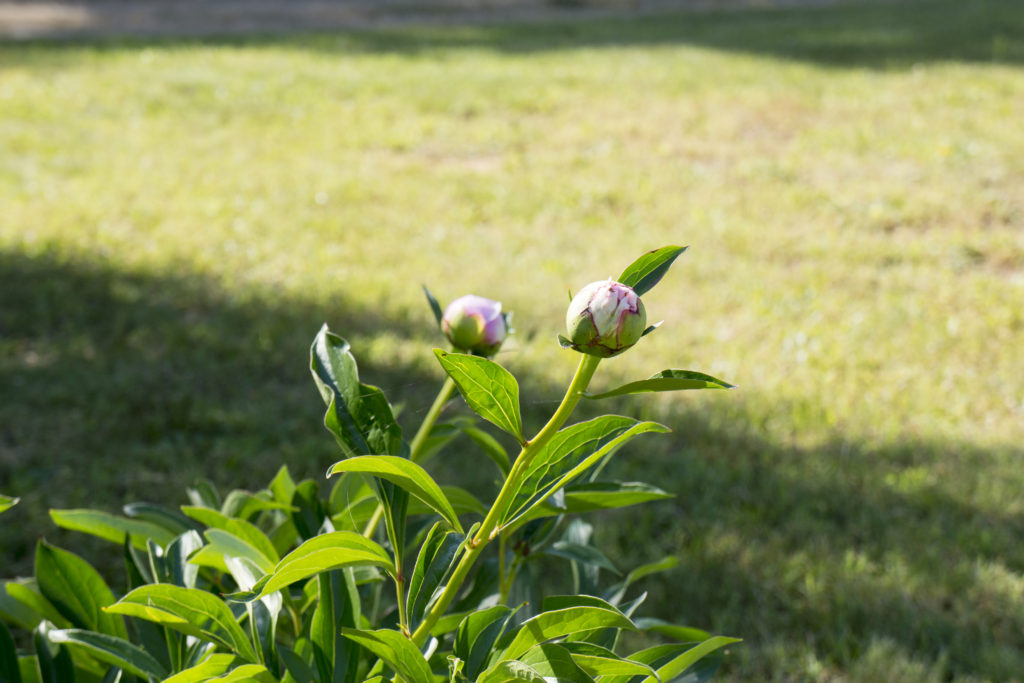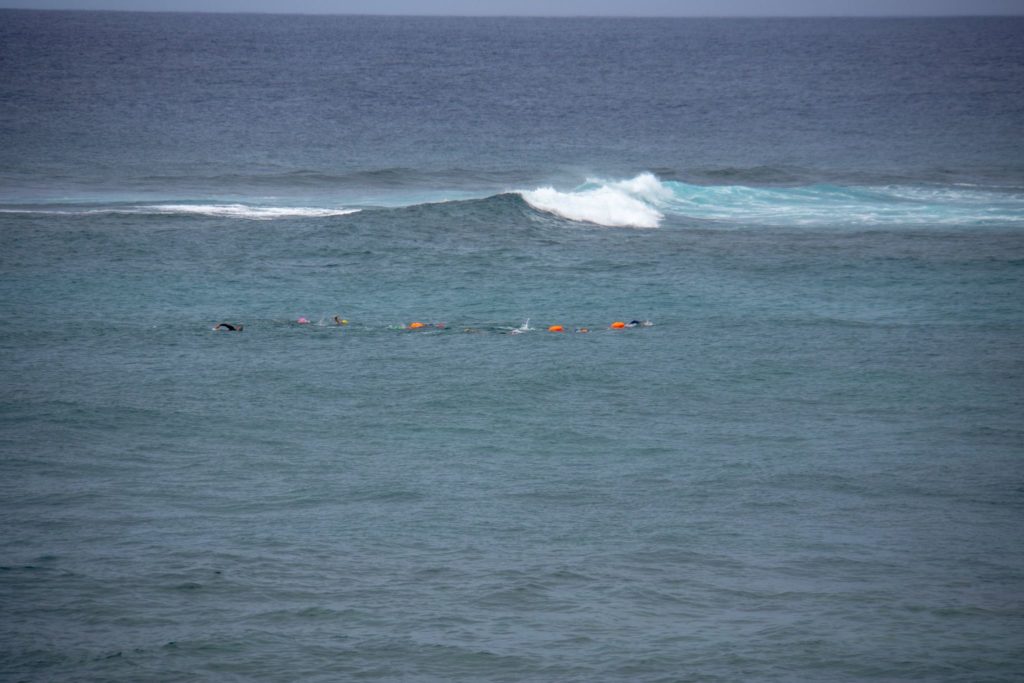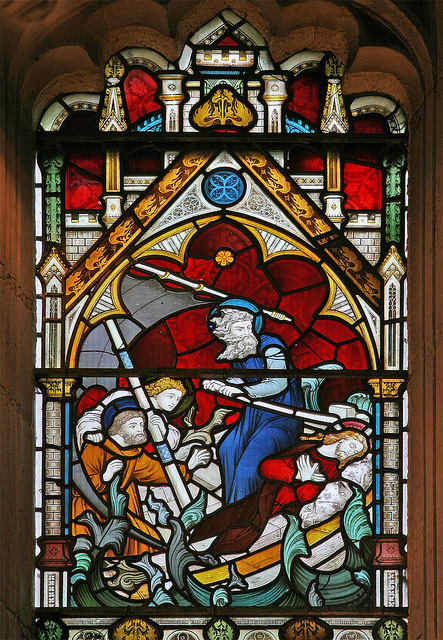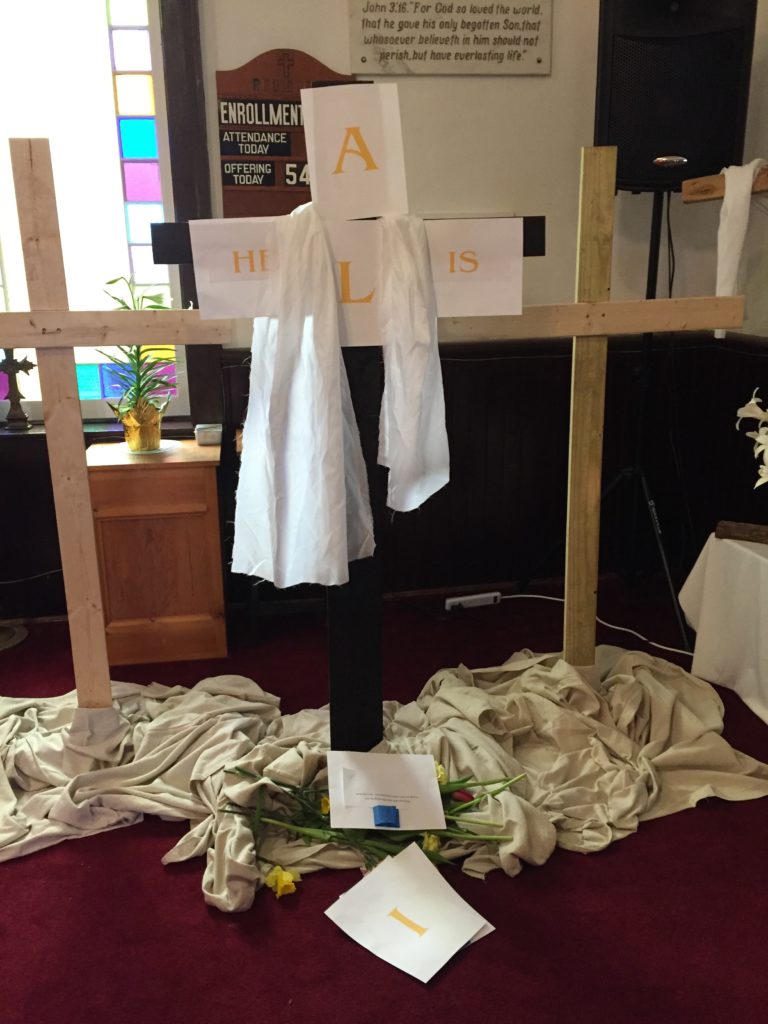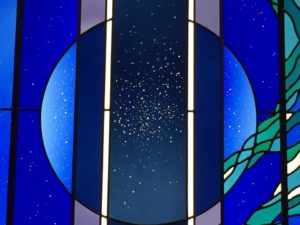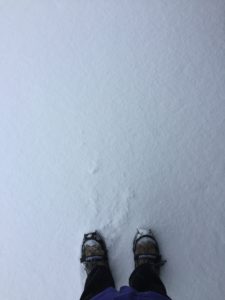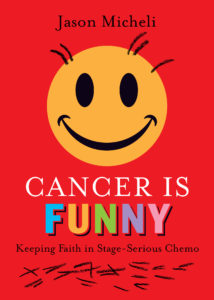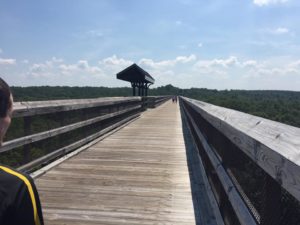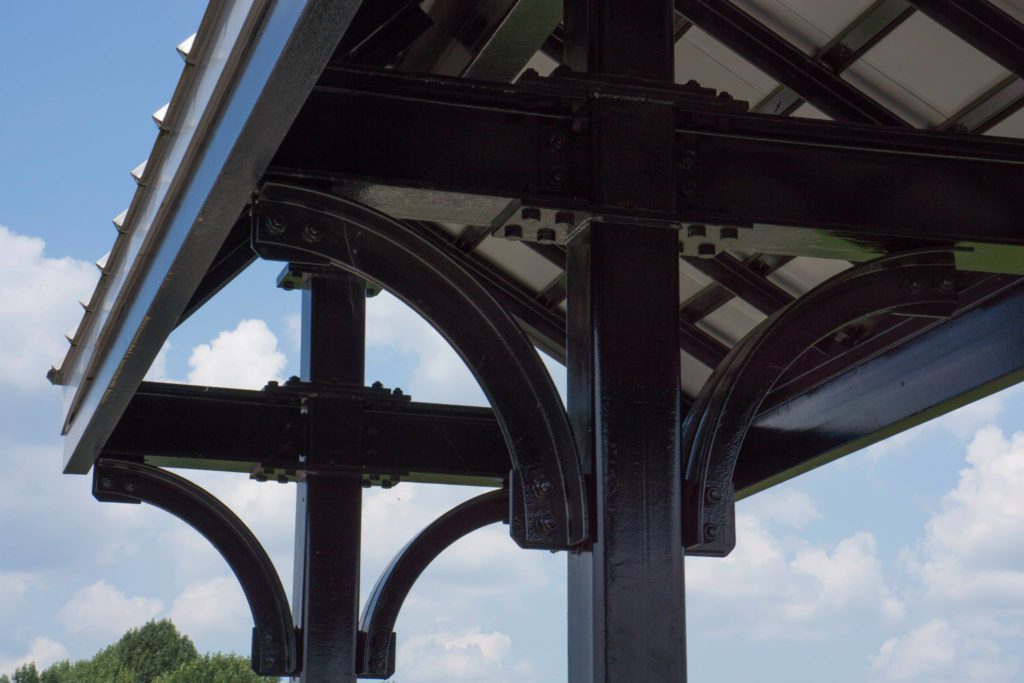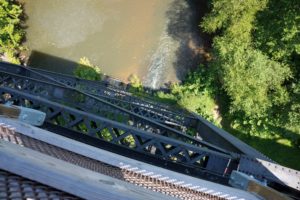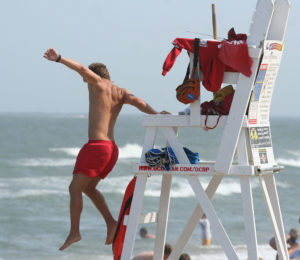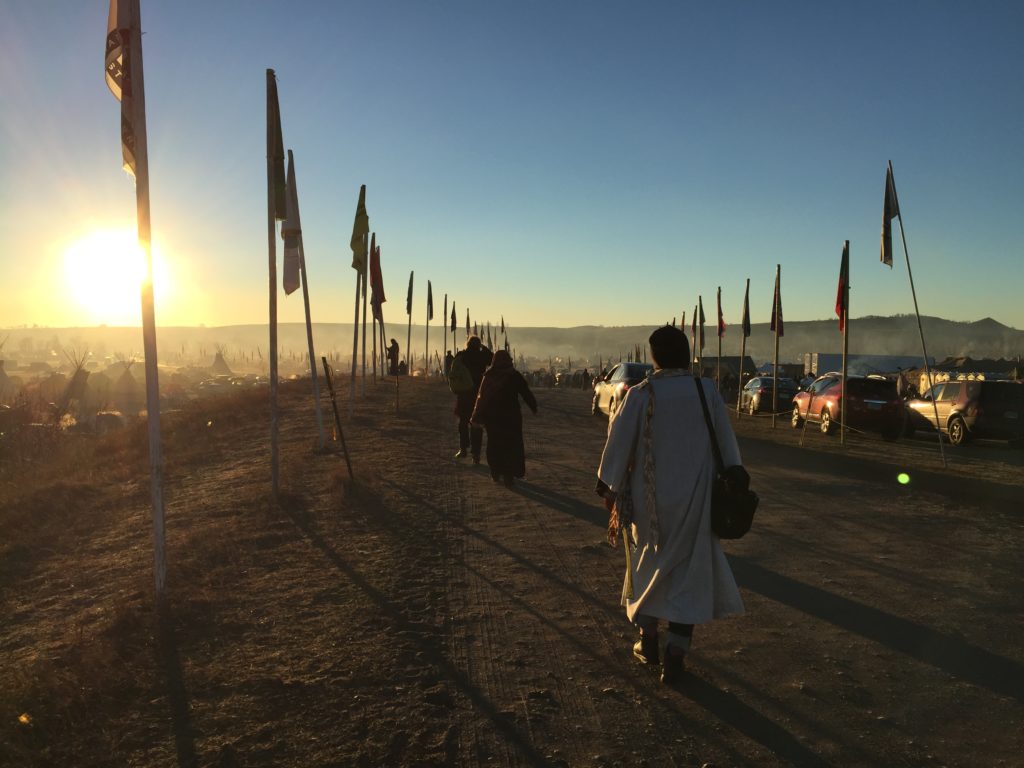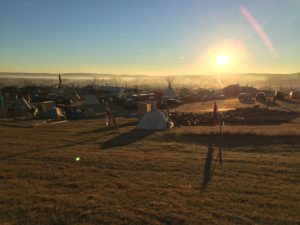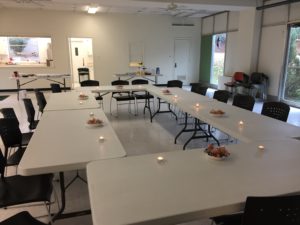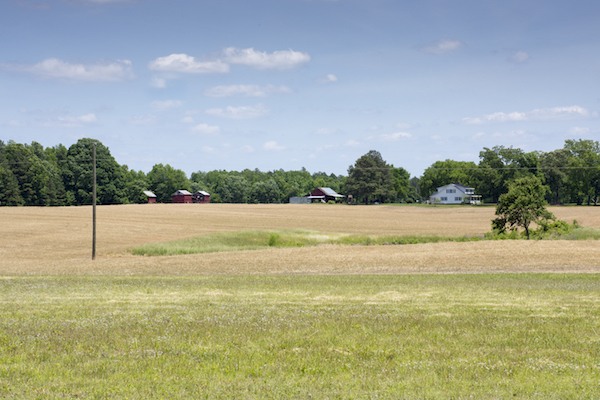
I am from the white farmhouse with the generous porch
with the generous porch
and the little red barns
lined up like ducklings behind it.
I am from flowers wet with rain,
planted with love,
bowing to kiss the earth.
I have stood in a tobacco barn just once. The tobacco was dry and crinkly, hanging above our heads, sweet-smelling like the end of an unburnt cigarette. My grandfather took me to the barn, which belonged to my great-uncle Dennis, my grandmother’s baby brother. I was about nine and I think it was early fall, evening. The barn was cozy, lit in flicker and flame by the fire they were using to cure the dark tobacco. We were in Brunswick County, Virginia, where my dad was born and sold his first crop of tobacco when he was eleven years old. His parents gave him a small section of the family field and whatever he could make of it was his. I grew up hearing of Dad’s early farming skills, but stepping into that warm and fragrant barn for a few minutes one cool evening was as close as I ever got to farming.
I know tobacco fields when I see them whizzing by from a fast car, though I’ve never worked in one. I’ve never worn long sleeves in hot weather so I could stick the large yellow leaves of flue tobacco, sticky with wax, under my arm as I made my way down a row of plants. I’ve never worked dark tobacco, the plants my dad calls “beautiful” with emotion in his voice, as he describes their leaves “draping to the ground like wings.” I’ve never carried a knife to split their stalks down the middle and then cut them off at the base, leaving them to wilt a bit in the sun before I turned them upside down over tobacco sticks, then hung the sticks on tier poles and carried the loads to cure in the barn. My brother worked the fields three summers in a row, though he easily could have worked at Busch Gardens or a tourist restaurant in Williamsburg, where we lived. He chose the fields and he kept going back, for the “camaraderie and freedom,” he said wistfully when I asked him about it twenty years later.
I opted for summer jobs at Busch Gardens, where my main connection to tobacco was the year I aimed to catch the eye of a chain-smoker who also worked there. I bummed cigarettes and tried to like smoking, but the allure faded like he did when school started up in the fall. Most people in my extended family smoked. A lot. Not my parents or grandparents when I was growing up, but almost everyone else. I made a game of it when we visited aunts, uncles, and cousins all over Brunswick county, where my grandparents lived: Could I find a house without cigarettes and tall glass bottles of Pepsi?
As long as I can remember, I’ve known the fabric of life was woven differently in the country than at our house. Like a well-prepared tourist with a few key phrases at the ready, I can say “flue tobacco” or “dark tobacco,” and I know you “pull” (not “pick”) flue and you “cut” dark, but I don’t know much more. I know that even my tobacco-tourist lingo is old school now, in a time when machines do most of this work. I also know how to spot the best homegrown tomatoes, though I’ve never grown them successfully on my own. I call certain roads “four lanes” and I am not startled when the doorbell rings unexpectedly in the country, the way I am at my house, where my first thought is “Who would be coming here?”
As kids, we suburban grandchildren dubbed our grandparents’ house The Country House, which made sense of the contrast and the pull we felt between this place and our regular lives. When I hear myself refer to it that way now, I realize it may sound grander than we meant it. Think Oak Ridge Boys and firecrackers in the yard, not gated estates and golf pants.
The Country House sits on a spot of land in Brunswick County, about twenty acres worth. The land once belonged to my great-grandparents, who carved it off of their own land to give to my grandparents, who lived on it and loved it and then left it to my dad. Across the eastern field and up the road about a quarter-mile from this spot, my great-grandparents owned the house that’s still there at the top of the rise. Every visit I’ve made to The Country House, I have stood in the side yard, rooted, looking east at that other house. Standing in place, the sight of that white farmhouse and the multiple red barns lined up behind it to the woods’ edge is home to me. I never lived there and neither did my dad, but when I stand in the side yard of The Country House looking out past the lawn and then the field, letting my eyes swoop up the hill and land on the white house and red barns, I am a compass needle pointing north. That’s home. That’s where I come from. Like a magnet, I move in the direction of that comforting, solid, timeworn site.
I am from slanted afternoon sunlight across the cornfield,
streaking in beneath half-pulled-down vinyl shades
in my grandmother’s kitchen;
from long summer nights on the porch,
listening to cicadas
and wishing on stars.
I am from fresh homemade biscuits,
tomato sandwiches,
salted watermelon
eaten outside by the woods,
and chocolate meringue pie.
If you wake up past 7am in Brunswick County in July, it’s already hot and sticky. When our parents dropped us off to visit our grandparents for a week every summer, I slept in the middle bedroom on the east side of the house, nothing but a thin white roller-shade of plastic on the window between my bed and the sun rising over the tobacco field. It curled in at the edges and was framed in piercing yellow sunlight by 7am. That bright rectangle around the curled shade was my alarm clock, warning me it would only get hotter the longer I waited.
With my brother and cousins, I spent those summer days trekking through the woods behind the house until we found the creek or a deserted deer stand, picking up shotgun shells like archeologists putting together an ancient story. Many days I skirted the edge of the field where it met the lawn, gathering flowers to arrange in a glass for my grandmother, who always received them with sincere gratitude though it’s likely they were all weeds. We helped hang laundry on the clothesline, slinging clothes up and over, using the wet weight to pull the line near enough for our short arms to use the pins. We would go back out later to take down the scratchy, stiff-dried, wind-scented clothes, yanking on the now-higher lines until the clothes came down in our hands and the pins popped off and landed in the grass. Like baseball players with the sun in our eyes, it was hard to follow the flying pins against the lit sky. We took naps from which we awoke groggy and sweaty, wet hair plastered to the sides of our faces and imprints from the sheets visible on our cheeks. In the evenings, we sat on the front porch, cooling down, waiting for stars, and commenting on the occasional cars coming down the road.
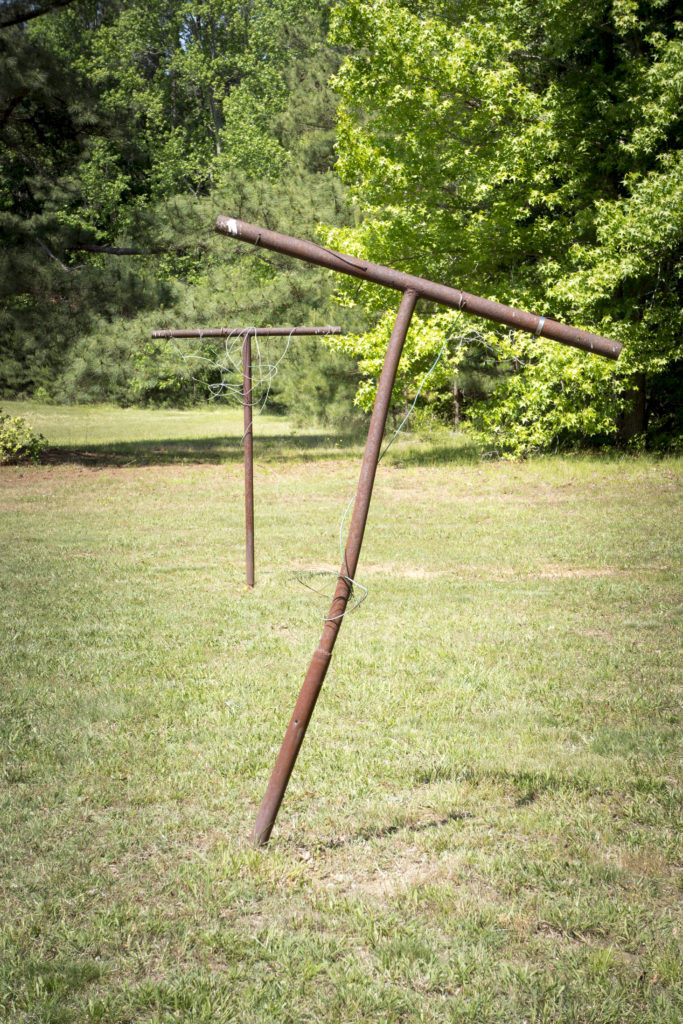
Running up to the store in the truck for a loaf of bread and a quart of milk was a delight we hoped for on a daily basis. My grandparents and everyone in the county called the store Ham’s, after the man who owned it, but my cousins and brother and I called it The Candy Store, after our main purpose in riding along on these errands. It stood at the crossroads of Danieltown (“Daniel” being my grandmother’s maiden name), where the only other thing in “town” was an old school. We rode in the back of the truck, wind whipping our hair and making it impossible to talk, though we shouted at each other anyway. Stepping into The Candy Store was like stepping into my father’s childhood, or my grandfather’s. Most people shopped there for staples like bread, milk, cigarettes, and diapers, in between grocery store runs to town. Other items collected dust, sitting on their shelves a long time without being disturbed. It smelled like cigarettes and wood smoke and oil. Smooth, worn, uneven wood plank floors creaked under our feet as we bypassed the three dusty aisles of canned goods, headed straight for the wall beside the cash register–the candy display–where we were each allowed to choose one treat, and we sometimes made it the whole two and a half miles home before we ate them.
The summer of sixth grade, we had a family reunion coming up and my grandmother spent the week beforehand baking desserts. Each morning, by the time the sun reached in around the shade and woke me, she already had the oven on in the west side of the house, trying to get the baking done before noon to keep the heat down. After lunch when the goodies had cooled, she sent me across the road with a sample for her sister, the receptionist at their brother’s oil company. By this time of day, Aunt Dollie was sitting in Uncle Dennis’s office watching her stories on the television. I came in with our samples “to see if they were good enough for the reunion” and Aunt Dollie taste-tested them and introduced me to the world of General Hospital. That was the year I had poison ivy so I sat on the floor in front of the oscillating fan, the back of my shirt pulled up so the breeze could cool the bumps on my back, eyes glued to the travails of Port Charles.
At every family reunion or holiday, desserts had their own, full table. I loved the pies–pecan, cherry, lemon meringue, chocolate meringue, coconut–and I even loved the “salads,” Jell-O, fruit, nut, marshmallow, and cream cheese concoctions that somehow didn’t count as desserts. My grandmother fried delicious chicken and there were always a few quarts of Brunswick stew in the deep freezer.
But the standouts were the fresh fruits and vegetables, straight from the field. The first cantaloupe I remember eating was in the kitchen of my grandmother’s sister, Aunt Marg. The light tan, bumpy-veined rind was sun-warmed and the whole kitchen smelled of cantaloupe even before we cut into it. Entire weeks were spent putting up fruits and vegetables for later, leaner seasons we could hardly imagine at the height of summer. A late summer canning operation was a beautiful and beastly hot enterprise, providing tomatoes for the rest of the year, while seeming not to put a dent in the fresh ones I ate at every meal.
When I became a vegetarian as an adult, my family thought it was strange and had trouble understanding baked beans aren’t “just beans” if they have pork in them. It seemed strange to me they couldn’t see how my love affair with vegetables began on those weeklong summer visits, overflowing with tomatoes, corn on the cob, butter beans, homemade pickles, and snaps still warm from the field when we started fixing dinner. I often ate an entire plate of sliced tomatoes with salt and pepper, and a biscuit. It was more than enough.
I am from Sunday school felt boards
and out-of-tune pianos
playing hymns too loudly.
I am from standing outside after church
in the gravel parking lot,
sun directly overhead,
slapping bare legs and arms
to keep the bugs away,
while our grandparents visited.
Several summers ago now, I attended the final worship service at the church a mile up the road from The Country House. After years of dwindling membership, it was time to shut the doors of the congregation founded in 1803, where my grandmother’s family had been members since the 1830s. A handful of years had already passed since my grandparents each made their final visits to Rocky Run United Methodist Church, where they are both buried in the graveyard out back, along with two sets of my great-grandparents and many other relatives.
Wandering around during the potluck after the service, I encountered a little boy looking around the same Sunday school room as I was, marveling over the stacks of hymnals and other curiosities. He picked up an old, dry-rotted, six-inch-long, thick wooden peg, sharpened like a pencil lead on one end.
“Know what this is for?”
I didn’t.
“In the olden days, when they were planting tobacco, they’d take one of these and use it like this.” He used the point of it to move the pretend earth away and create a pretend hole. He looked up at me as he demonstrated.
“So you would make a hole with that and then put the seedling in the hole?”
“Yep.”
“Are you a tobacco farmer?”
“Yes, ma’am.”
It was an odd conversation to have in a Sunday school room piled with musty ancient hymnals, with a child I’d never met, in a place I probably won’t enter again. I was glad he wanted to show me and explain it, pleased to see him puff his chest with pride when I recognized him as a farmer. As I said, I don’t smoke. I’m not a fan of cigarettes or the companies that make them. I’m not even an apologist for my family of tobacco farmers, past and present. But I can’t tell you the last time I spoke to a child so certain of his own talents and his place in the world. Farming in that flat, red clay county with the earth-tethered people there did that for him. Dismiss that at your own peril.
I’m a campus minister in a college town with competitive and brilliant students. Those whom I get to know are warm and open and earnestly looking for God’s fingerprints in the important stuff of their lives. When I share stories about my ministry with friends who only know the stereotype of University of Virginia students, they are surprised at the quality and character of the students with whom I am honored to spend so much time.
And yet.
There is a veneer here. Distance. Life lived too much in our minds, trying to encompass too much in too short a time. We’re all just passing through. In this town, we don’t expect anyone to ask us how we are and, if they do, we don’t give the real answer. At this school, we live in semesters and class years; we live by our intelligence and what it can get us next.
I am from the calls
of the whippoorwill
and the bobwhite,
from the mist
rising off the pond in early morning.
I am from trying to put the worm on the hook myself
but needing my granddaddy to do it for me.
I am from the prickly feel of fish scales
on the one he caught.
I am from backwoods
and tobacco farms
and red clay earth.
Our family visited Monticello when I was in grade school and I mimicked my dad’s revered tones in describing it when I shared the experience afterwards for Show and Tell. The more profound reverence came from within me, for the mountains we saw rising up against the horizon, smoky blue above the highway as we drove westward. On that trip, something previously submerged in me recognized mountains, though I’d never seen any in real life before then. I couldn’t get them out of my mind after that. I’d grown up in the Tidewater region of coastal Virginia, surrounded by flat land, marshes, and open water, able to drive to the beach for the day, but the mountains felt like my place.
I exhale and reset when I see their profile against the sky. My mom’s family is from West Virginia, so the calling of the mountains makes a certain sense. In my twenties, I lived in the heart of Appalachia for four years and “discovered” my Appalachian heritage. There in the days before the Internet, I both loved and resisted the remoteness of the place and the people.
Despite the veneer, I love Charlottesville–artists and thinkers and students all camped together at the edge of the Blue Ridge, in the Piedmont foothills. But I don’t feel known here–even in this landscape and community I love–the way I do in the flat tobacco county I never lived in.
My grandparents have been dead for years, and the family is large enough that I don’t always know who my relations are, but there are many places in Brunswick County where I could walk in and immediately be hailed as “Blanche’s granddaughter” or “Dudley’s daughter.”
It may sound like a small thing. It’s not.
By now I’ve lived far from home and made my life in different places. The suburban Tidewater girl in me can take one look at a sky and tell which way to big water. I lived with a French family one semester in college and I still crave café crèmes and the art of everyday life in all its French sensibility. I was in Appalachia long enough to know soup beans and to feel my heart tug when the radio station plays Bluegrass Sunday Morning. I’ve spent time in the urban South of Nashville and Atlanta, listening to music in dark clubs, feasting on vegetarian fare in spots formerly known for use of lard, and constantly being told with a wink that I don’t sound like I’m from the South. My British Goddaughter laughs at how I talk, too, but for other reasons entirely. I’ve come to love a lot of places and I’ve been given glimpses of home in strange lands.
Still, I return to that iconic white house and red barns. My compass needle keeps pointing at that landscape, though I don’t think I ever want to live there. It is about a deep, long, knowing I can barely comprehend. It’s about the way the stretch of land, and the sound of birdcalls in the morning, and the smell of rain in the late afternoon hit something deeper than I normally access.
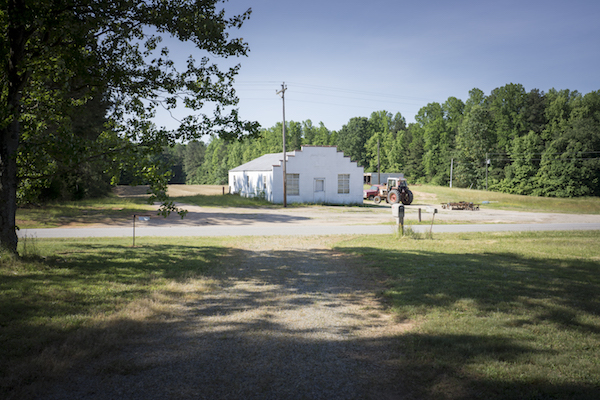
I am from farmers
who took second jobs in town
at the gas station and the bank
to make ends meet.
I am from the second generation, who moved away,
and the third, who only knew this place in the summers,
on short visits,
and whose accents don’t match the terrain.
I am from feeling at home
and out of place
at the same time.
When I was nineteen, visiting from college, my grandmother and I were sitting in the yard visiting with neighbors, a middle-aged woman and her nineteen-year-old daughter. The woman my age was pregnant and the three of them were talking about young marriages, pregnancy, and small children. Listening, I did the math and realized I was the only one of the four of us who had made it to nineteen without becoming pregnant. I didn’t think I was missing out on anything yet but I wondered if they did.
My dad was the first in his family to go to college. He still doesn’t know how my grandmother managed to send him money every month when he was away at school, or what my grandfather wore after he’d sent my dad off with the lone wool coat from his own closet. The responsible eleven-year-old tobacco farmer became an electrical engineer and raised his family in the suburbs, where his kids always knew we’d go to college. He and my mom made sure my brother and I took piano and swim lessons and got to go on the school field trips. They made sure we never went a summer without a trip to the country. Our summer trips to The Country House were visits to see our grandparents, like anyone’s family visits, but they were also an introduction to what we otherwise only heard about in Dad’s stories.
Maybe they were an induction, too, something deeper taking root. All those summer days, counting time in light and shadow as the sun moved across the fields, all those tomato sandwiches, all those visits up the road to family I’d never seen or heard of, “He’s your cousin” my grandmother’s favorite and sufficient explanation when I’d ask…all of it planting that place in me. I don’t know how else to account for the pull.
For a while after my grandparents died, Dad visited The Country House for a few days most months, to make repairs on the house or to visit nearby county courthouses for genealogy research. My own visits were infrequent and quick, squeezed in between work, meant for secluded rest apart from the daily rush. Most of the time I found the house empty, clean and musty.
On one of my last visits, I was in the middle of frying up some Fakin’ Bacon tempeh strips for a vegetarian BLT when elderly cousins stopped by because they saw the car and wondered who was home. We visited a few minutes while I tended the tempeh, their eyes curiously glued to the pan, though they politely never asked what in the world I was cooking. I never stop in on friends where I live. We never just visit.
The distant cousins we played with as kids–the ones who lived in the white farmhouse with the generous porch–still live there and they still farm. One of them lives in the farmhouse and his brothers are scattered in trailers and houses up and down the road in both directions. One of them mowed the lawn for my dad at The Country House in the years before he sold the property to another cousin. They farm, but they also have other jobs. They have to. It’s that or leave.
Even my grandparents had to leave the country for a time, for work in other places, with hearts longing for home. Most of my childhood they lived and worked in the Washington, D.C. suburbs and went home for every vacation and as many weekends as possible. This is how they managed until they retired and went back home full time. As a kid, I didn’t question this. As an adult, I never thought to ask what that time away was like for them, the year that turned into twenty. They must have known a pull much deeper than the tug I feel.
I am from the changing and steadfast landscape
planted
by the ones who came before.
I am from life
offered
one slice of pie
one bedtime story
one pin-pricked starry wish-filled dark night
at a time.
In the early spring the year after my grandmother died, and almost four years after my grandfather’s death, I visited their empty house and spent an afternoon on the front porch listening to the rain. It had been twenty-five years since our annual summer visits ended when high school did.
In my youngest years, there was nothing but a circular driveway between the house and the road, so I caught myself surprised at the tall trees and abundant bushes shielding the house from the road now. My grandmother had planted them all, one by one, over so many years I stopped noticing the landscape didn’t match my early memory anymore. When the rain stopped, I walked through the thicket she’d grown, noticing what looked healthy and what needed pruning. I thought of the countless trips she’d made, hauling water in five-gallon buckets to each and every one of these living things.
In the side yard, I followed a loose line of flowering shrubs, a windbreak of sorts before the western field. Pale pink, floppy-headed flowers, too weighty for their stems, bent the limber branches to kiss the ground. I had to look them up later to discover their name: peonies. When I lifted one floppy head to breathe its sweet fragrance, tears came unexpectedly to my eyes, and I was overcome with the connection to my grandmother, holding in my hands the bloom she nurtured.
I am from courage and longing
and the beauty of the indirect route
home.
